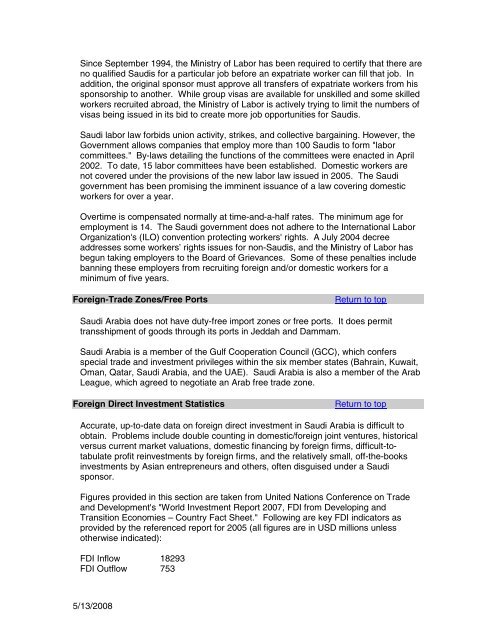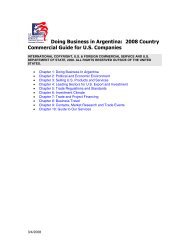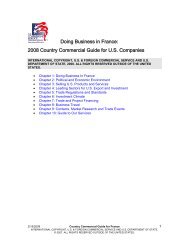Doing Business In Saudi Arabia - Bna
Doing Business In Saudi Arabia - Bna
Doing Business In Saudi Arabia - Bna
Create successful ePaper yourself
Turn your PDF publications into a flip-book with our unique Google optimized e-Paper software.
Since September 1994, the Ministry of Labor has been required to certify that there are<br />
no qualified <strong>Saudi</strong>s for a particular job before an expatriate worker can fill that job. <strong>In</strong><br />
addition, the original sponsor must approve all transfers of expatriate workers from his<br />
sponsorship to another. While group visas are available for unskilled and some skilled<br />
workers recruited abroad, the Ministry of Labor is actively trying to limit the numbers of<br />
visas being issued in its bid to create more job opportunities for <strong>Saudi</strong>s.<br />
<strong>Saudi</strong> labor law forbids union activity, strikes, and collective bargaining. However, the<br />
Government allows companies that employ more than 100 <strong>Saudi</strong>s to form "labor<br />
committees." By-laws detailing the functions of the committees were enacted in April<br />
2002. To date, 15 labor committees have been established. Domestic workers are<br />
not covered under the provisions of the new labor law issued in 2005. The <strong>Saudi</strong><br />
government has been promising the imminent issuance of a law covering domestic<br />
workers for over a year.<br />
Overtime is compensated normally at time-and-a-half rates. The minimum age for<br />
employment is 14. The <strong>Saudi</strong> government does not adhere to the <strong>In</strong>ternational Labor<br />
Organization's (ILO) convention protecting workers' rights. A July 2004 decree<br />
addresses some workers’ rights issues for non-<strong>Saudi</strong>s, and the Ministry of Labor has<br />
begun taking employers to the Board of Grievances. Some of these penalties include<br />
banning these employers from recruiting foreign and/or domestic workers for a<br />
minimum of five years.<br />
Foreign-Trade Zones/Free Ports Return to top<br />
<strong>Saudi</strong> <strong>Arabia</strong> does not have duty-free import zones or free ports. It does permit<br />
transshipment of goods through its ports in Jeddah and Dammam.<br />
<strong>Saudi</strong> <strong>Arabia</strong> is a member of the Gulf Cooperation Council (GCC), which confers<br />
special trade and investment privileges within the six member states (Bahrain, Kuwait,<br />
Oman, Qatar, <strong>Saudi</strong> <strong>Arabia</strong>, and the UAE). <strong>Saudi</strong> <strong>Arabia</strong> is also a member of the Arab<br />
League, which agreed to negotiate an Arab free trade zone.<br />
Foreign Direct <strong>In</strong>vestment Statistics Return to top<br />
Accurate, up-to-date data on foreign direct investment in <strong>Saudi</strong> <strong>Arabia</strong> is difficult to<br />
obtain. Problems include double counting in domestic/foreign joint ventures, historical<br />
versus current market valuations, domestic financing by foreign firms, difficult-totabulate<br />
profit reinvestments by foreign firms, and the relatively small, off-the-books<br />
investments by Asian entrepreneurs and others, often disguised under a <strong>Saudi</strong><br />
sponsor.<br />
Figures provided in this section are taken from United Nations Conference on Trade<br />
and Development's "World <strong>In</strong>vestment Report 2007, FDI from Developing and<br />
Transition Economies – Country Fact Sheet." Following are key FDI indicators as<br />
provided by the referenced report for 2005 (all figures are in USD millions unless<br />
otherwise indicated):<br />
FDI <strong>In</strong>flow 18293<br />
FDI Outflow 753<br />
5/13/2008












